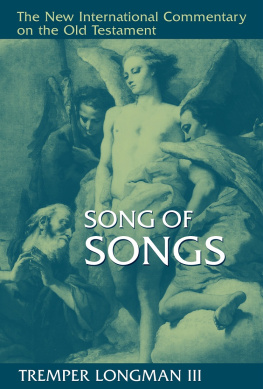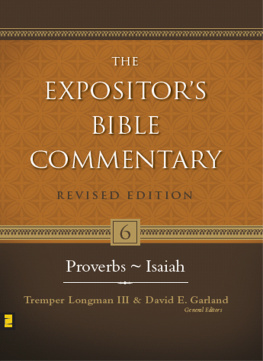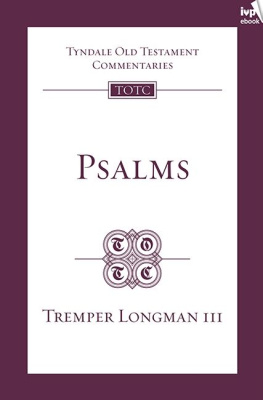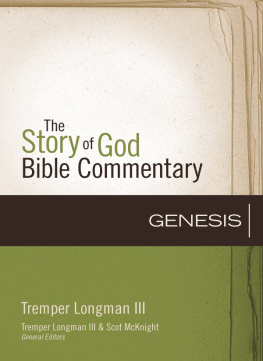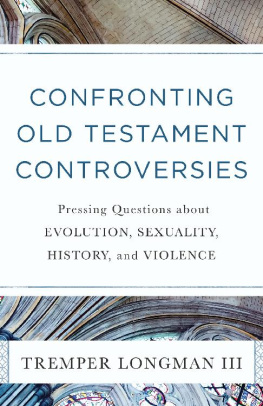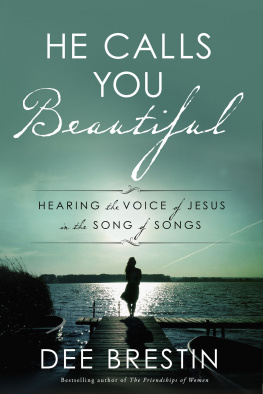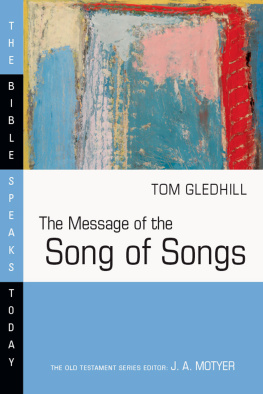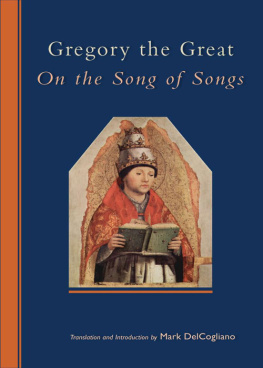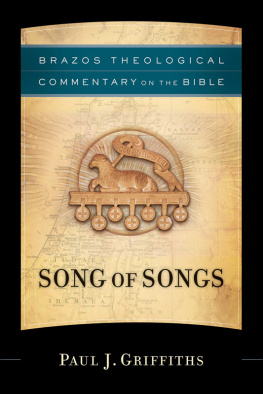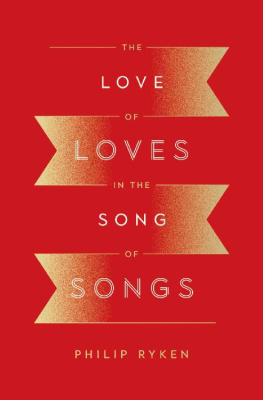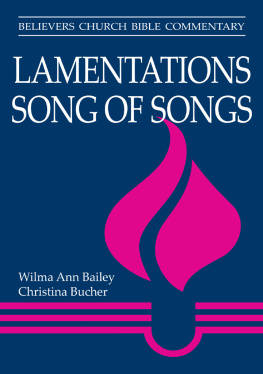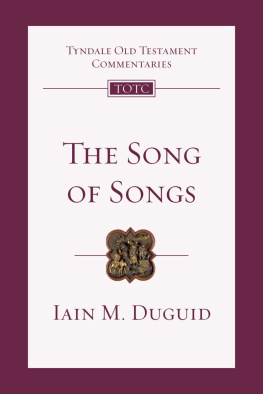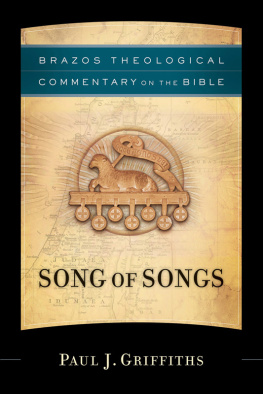THE NEW INTERNATIONAL COMMENTARY
ON THE
OLD TESTAMENT
General Editors
R. K. HARRISON (1968-1993)
ROBERT L. HUBBARD, JR. (1994)
SONG OF SONGS
TREMPER LONGMAN III




To Alice
CONTENTS
xi
xiii
xv
INTRODUCTION
TEXT AND COMMENTARY
INDEXES
GENERAL EDITOR'S PREFACE
Long ago St. Paul wrote: "I planted, Apollos watered, but God gave the growth" (1 Cor. 3:6, NRSV). He was right: ministry indeed requires a team effort - the collective labors of many skilled hands and minds. Someone digs up the dirt and drops in seed, while others water the ground to nourish seedlings to growth. The same team effort over time has brought this commentary series to its position of prominence today. Professor E. J. Young "planted" it forty years ago, enlisting its first contributors and himself writing its first published volume. Professor R. K. Harrison "watered" it, signing on other scholars and wisely editing everyone's finished products. As General Editor, I now tend their planting, and, true to Paul's words, through four decades God has indeed graciously "[given] the growth."
Today the New International Commentary on the Old Testament enjoys a wide readership of scholars, priests, pastors, rabbis, and other serious Bible students. Thousands of readers across the religious spectrum and in countless countries consult its volumes in their ongoing preaching, teaching, and research. They warmly welcome the publication of each new volume and eagerly await its eventual transformation from an emerging "series" into a complete commentary "set." But as humanity experiences a new century of history, an era commonly called "postmodern," what kind of commentary series is NICOT? What distinguishes it from other similarly well-established series?
Its volumes aim to publish biblical scholarship of the highest quality. Each contributor writes as an expert, both in the biblical text itself and in the relevant scholarly literature, and each commentary conveys the results of wide reading and careful, mature reflection. Ultimately, its spirit is eclectic, each contributor gleaning interpretive insights from any useful source, whatever its religious or philosophical viewpoint, and integrating them into his or her interpretation of a biblical book. The series draws on recent methodological innovations in biblical scholarship, e.g., canon criticism, the so-called "new literary criticism," reader-response theories, and sensitivity to genderbased and ethnic readings. NICOT volumes also aim to be irenic in tone, summarizing and critiquing influential views with fairness while defending their own. Its list of contributors includes male and female scholars from a number of Christian faith-groups. The diversity of contributors and their freedom to draw on all relevant methodologies give the entire series an exciting and enriching variety.
What truly distinguishes this series, however, is that it speaks from within that interpretive tradition known as evangelicalism. Evangelicalism is an informal movement within Protestantism that cuts across traditional denominational lines. Its heart and soul is the conviction that the Bible is God's inspired Word, written by gifted human writers, through which God calls humanity to enjoy a loving personal relationship with its Creator and Savior. True to that tradition, NICOT volumes do not treat the Old Testament as just an ancient literary artifact on a par with the Iliad or the Gilgamesh Epic. They are not literary autopsies of ancient parchment cadavers but rigorous, reverent wrestlings with wonderfully human writings through which the living God speaks his powerful Word. NICOT delicately balances "criticism" (i.e., the use of standard critical methodologies) with humble respect, admiration, and even affection for the biblical text. As an evangelical commentary, it pays particular attention to the text's literary features, theological themes, and implications for the life of faith today.
Ultimately, NICOT aims to serve women and men of faith who desire to hear God's voice afresh through the Old Testament. With gratitude to God for two marvelous gifts - the Scriptures themselves and keen-minded scholars to explain their message - I welcome readers of all kinds to savor the good fruit of this series.
ROBERT L. HUBBARD, JR.
AUTHOR'S PREFACE
Relationship is a wonderful, mysterious, often elusive, sometimes painful part of the human experience. Family, friends, colleagues, and acquaintances are the characters that people the plot of our lives. The most intimate of all human relationships, according to the Bible at least, is that between a husband and a wife. Indeed, as the commentary will later argue, this relationship provides a powerful analogy to that most fundamental of all relationships - God and his people.
It is, thus, not a surprise that there is a book of the Bible that focuses on the experiences and emotions of intimate male-female relationship. Though it has had a long history of repression by interpretation, the Song of Songs is now widely recognized as a poem celebrating human love and sexuality.
The late R. K. Harrison invited me to write this commentary about a dozen years ago. Though it was not the sole object of my professional interests, I started teaching the book regularly since that time. I would like to take this opportunity to thank the many students I have had in courses on the Song, often coupled with Ecclesiastes, at Westminster Theological Seminary, Fuller Theological Seminary, Regent College (Vancouver), Mars Hill Graduate School (Seattle), and Westmont College. Special mention should be given to a small doctoral seminar I gave a Trinity Evangelical Divinity School where the students were both insightful and helpful. It was particularly my years at Westminster, where I taught five doctoral seminars between 1989 and 1999, the last as a Visiting Professor, that played an important role in shaping my ideas about the Song. In particular, I would like to thank three of my doctoral students who chose to write on the Song - George Schwab, Steve Horine, and Phil Roberts. I will show my indebtedness to their work by way of footnotes. Further, I am grateful to my two student assistants, Erik Allen (Philadelphia) and Jake Werley (Santa Barbara), who helped me by tracking down references.
However, my interest in the Song was piqued even before I began my teaching career. I had the distinct pleasure of studying with two teachers in my graduate program at Yale University who also loved and studied the Song. First, my doctoral advisor W. W. Hallo was interested in the way that Mesopotamian material illuminated our understanding of Song of Songs 8:67. Second, though I never studied the Song with him, my three years of Ugaritic with Marvin Pope brought me into contact with this monumental thinker about this book. One of the earliest memories of my graduate program was a party at his house celebrating the publication of his new commentary. Unfortunately, I cannot adopt his basic ideas about the Song, but the fact that no work is quoted more often in the following pages demonstrates that his contribution is not dependent on his distinctive approach.

